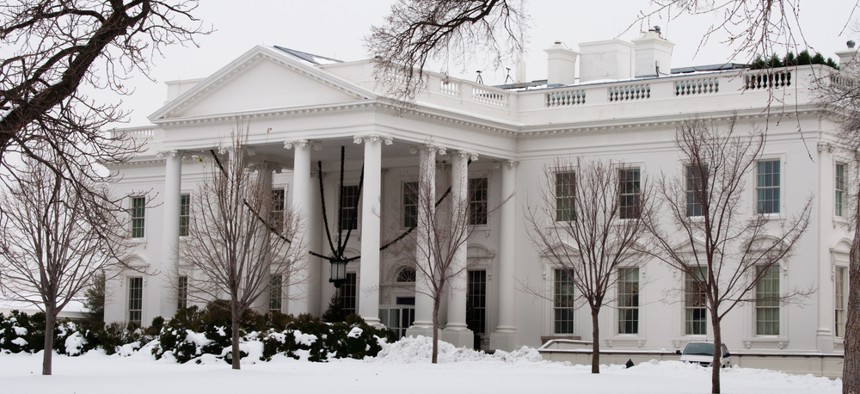
Ryan Rodrick Beiler/Shutterstock.com
Obama, Democrats Take Keystone XL Fight to Republicans
Pipeline opponents grabbed the spotlight as the new congressional session began.
The White House and Senate Democrats sought to seize political momentum in the Keystone XL battle Tuesday, and make the fight less about the oil pipeline and more about claims that Republicans are quickly abandoning pledges of cooperation across the aisle.
The White House finally said that, yes, President Obama will veto legislation that forces approval of the pipeline—and suggested Republicans were acting in bad faith by even bringing it up. On Capitol Hill, Senate Democrats pushed the narrative that new Majority Leader Mitch McConnell of Kentucky is already bending Senate procedures for partisan gain.
"It raises questions about the willingness of Republicans to work with this administration when you consider that the very first bill that [they] introduce is one that the president opposes," White House spokesman Josh Earnest said. Obama has made a series of critical statements about the project, which remains under State Department review, but has stopped short until now of vowing to veto the upcoming legislation.
The newest battle is unfolding against the backdrop of a steep drop in gasoline prices, which have fallen roughly 80 cents per gallon since early November to an average of $2.19 per gallon nationwide on Tuesday, according to AAA.
The veto threat arrived shortly after the bipartisan Senate duo of North Dakota Republican John Hoeven and West Virginia Democrat Joe Manchin formally introduced their bill to approve TransCanada Corp.'s proposed pipeline, which would carry oil from Canada's oil sands to Gulf Coast refineries. The White House claimed that the veto news arrived on Tuesday because the bill was formally unveiled.
Meanwhile, McConnell's office spent Tuesday explaining—and defending—the use of arcane Senate procedure.
Senate Republicans are bent on getting their Keystone bill on the floor fast and begin debate next week. But the incoming GOP leadership has also vowed to honor traditional Senate procedure, called "regular order." That means a trip through the Energy and Natural Resources Committee for the legislation to approve the pipeline.
So here's what Republicans are doing: The bill that comes to the floor in coming days won't technically be what the energy panel is slated to produce as soon as Thursday. Instead, GOP leaders will quickly bring up a Keystone-approval bill on the floor using the Senate's Rule XIV, which allows legislation to bypass committees.
Democrats pounced on the GOP maneuver.
"By moving to bypass committees on the first bill of the new Congress, Senator McConnell is signaling that his promises of regular order have already expired, and that he sees committees as nothing more than rubber stamps for Republican leadership," said Adam Jentleson, a spokesman for Harry Reid, the Senate's top Democrat.
McConnell's office defended the tactic. A spokesman said the Keystone legislation that moves through the Energy and Natural Resources Committee will be substituted for the bill that made a beeline to the floor under Rule XIV.
"With a new Congress, to get the wheels moving, we'll need to [Rule XIV] a base bill. But the committee product, produced through regular order, will take its place," said McConnell spokesman Don Stewart.
That wasn't even the only piece of procedural jousting to unfold on Tuesday. Wednesday's energy committee hearing on the bill was scuttled after Democrats blocked it. Sen. Dick Durbin, the chamber's second-ranking Democrat, said he was objecting to the hearing because a formal organizing resolution for the committees in the new Congress won't happen until tomorrow.
"I say to the Majority Leader we will continue this conversation in a positive manner in an effort to come up with a mutually agreeable approach to considering this legislation and others, but for that reason I object," Durbin said, according to a transcript.
A frustrated McConnell responded simply: "Nobody's rights would have in any way been impaired by going forward a day early. We're going to pass the committee resolutions tomorrow," he said on the Senate floor. "We all know that one of the things the Senate is best at is not doing much. ... Everyone knows the first measure that's going to be up is going to come out of the Energy Committee. I would say to my friends on the minority side: It will be open for amendment, why don't we get it started?"
Robert Dillon, an aide to new Energy Committee Chairwoman Lisa Murkowski, said it's unclear whether a separate Thursday committee meeting to vote on the Keystone legislation will proceed. He said it depends whether Democrats allow the committee to formally organize in time. "If they organize tomorrow, we can go ahead with the business meeting Thursday," he said.
Tuesday's attacks put Democrats on offense ahead of what will be tougher political days ahead. When the Senate eventually votes on Keystone, it will split the Democratic caucus to some degree. GOP gains in the midterms mean the bill easily has the 60 votes needed to beat a filibuster. Late last year, 14 Democrats joined Republicans in support of a failed Keystone bill.
McConnell, for his part, wondered aloud why Obama has now signaled a veto when the White House declined such a threat in November. That was when Democrats allowed Sen. Mary Landrieu of Louisiana to bring up Keystone legislation ahead of her runoff (she got crushed anyway).
"It's interesting to note that the President declined to issue a veto threat last month when a Democrat senator was trying to save her job over the exact same Keystone bill," McConnell said in a statement.
The House is expected to easily approve Keystone legislation on Friday.
Sarah Mimms contributed to this article.
(Image via Ryan Rodrick Beiler/Shutterstock.com)







